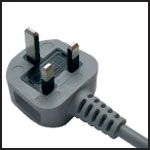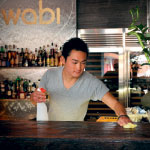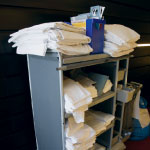Teamwork helps to keep things clean
Training and organisation are the keys to achieving the high levels of cleanliness now demanded by standards bodies such as the AA and by hotel and restaurant guests, reports Angela Frewin
Comprehensive inductions and ongoing training on the job are essential if you want to instil best cleaning practice and to protect staff from injuries, insists Arantxa Gomendio Ruiz, director at Hotelcare, which services around 180 hotels across the country.
While outsourced cleaning teams require training specific to the client hotel, some practices will be universal. For instance, Hotelcare staff are taught to prioritise public areas such as toilets, lobby areas and cigarette bins at entrances at the start of a shift and to check these areas on a rota throughout the shift.
Simple, step-by-step routines help the cleaning team make the most efficient use of their time. "For example, a cleaner will always be instructed to start cleaning behind the door and then move round the room in a circular direction after she has emptied the soiled linen and rubbish in the room and bathroom," Gomendio Ruiz explains.
But a truly effective cleaning programme requires teamwork across departments, she adds: "Systems should be put in place to ensure the cleaning and maintenance staff work together. Housekeeping teams should act as the first defence for maintenance departments, reporting any stains or problems."
Well-trained and efficient workers are not always enough, however. John Stevenson, founding partner of hotel cleaning services specialist ACT Clean, is finding that more and more luxury hotels want staff with "the attitude and the right fit" to reflect their values.
"Housekeepers used only to worry about finding people to clean rooms to the required standard - but now they need to be much more than ‘just' a cleaner," Stevenson says. "They're an ambassador for the brand and the experience."
Time-pressed clients are also seeking more support than before in areas such as health and safety and human resources and Stevenson says his company is now providing solutions such as an automated time and attendance tool and electronic quality monitoring.
John Brasco, managing director at Hotelcare, has found that more and more hotel chains and brands are centralising their purchasing for housekeeping and he predicts that outsourcing will eventually become the norm.
Brasco is lobbying for an annual open forum between contractors, HMRC/immigration, hoteliers and an independent body such as the British Hospitality Association to tackle a range of key issues, including standards of productivity. "To create reasonable benchmarks and levels across the industry would ensure a culture of best practice," he says.
A key mistake made by many hoteliers is to fail to involve housekeeping in the early stages of a revamp to assess the design and materials for durability, viability, compatibility and accessibility.
The Casna Group, which services more than 60 five- and four-star hotels in London, says this presents a major challenge to housekeeping as the ensuing difficulties are rarely budgeted into maintenance costs.
Sales and marketing director David Punter remembers a case of dark stonework rimming a swimming pool - where harsh chemicals cannot be used - having to be scrubbed with bicarbonate of soda to remove the limescale.
Other examples of problematic "style over functionality" he has encountered include:
â- White leather banquettes in bars
â- Light carpets in banqueting suites
â- The use of tactile materials such as suede on walls or white ostrich leather around stair rails
â- Placing leather flooring - which requires a waxy polish - alongside marble where polish can cause a slip.
TACKLING CUSTOMERS' KEY GRIPES
Stained carpets
Spot-clean stains with the appropriate cleaning solution immediately; call in a professional carpet cleaning company for more stubborn marks. Clean carpets thoroughly every three months.
Dust under beds and above wardrobes and doors
Run coat hangers over the top of wardrobes to remove any left or thrown items. Check high levels and under beds daily.
Dirty windows
Remove internal marks instantly. To prevent marks being masked by curtains, advise room attendants to leave curtains open and housekeepers to close them.
Dirty sanityware bowls and basins and paper on the floor in public toilets
Check the toilets every hour or more often when hosting conferences and parties, or when there is a high traffic of people.
Cigarette ends at hotel and bar entrances
As with public toilets, these areas should be checked at least each hour.
Source: Hotelcare
TOP 5 HOUSEKEEPING HAZARDS
â- Ensure attachments are securely fixed on
â- Do not let cables go under the machine or stretch across doors or stairways
â- Don't pull plugs out by the cable
Manual handling and lifting
â- Train staff in kinetic lifting techniques to avoid back injuries, strains and bruises.
Hazardous substances
â- Follow the instructions and wear protective clothing if required.
â- Wash hands after handling and report problems such as red, dry or itchy skin.
â- Do not mix different chemicals.
Slips, trips and falls
â- Wear anti-slip shoes
â- Report defective floor surfaces and badly-lit areas
â- Clean spillages
â- Ensure you have a clear view when carrying objects
â- Be careful handling breakfast trays
Lone working
â- Inform the manager and keep in touch with a radio or bleep
CHEMICAL-FREE CLEANING
The cloths are used damp without any chemicals and microbiological tests found they cleaned more efficiently than chemicals. They reduced the hotel's chemical store from seven to just two products - toilet cleaner and air freshener.
The simplified cleaning process boosted productivity by 7% - each member of the 20-strong cleaning team could clean an extra room a day - and made it easier and quicker to train staff. COSHH (Control of Substances Hazardous to Health) training was reduced by two hours per employee and the staff induction period halved to one week.
The lack of chemical residues on furniture and tables helped prevent burn-in marks from hot tableware and reduced table preparation times and linen usage, saving the hotel around £10,000 a year on tablecloths and laundry services.
Team members are issued with two sets of cloths, colour-coded for different surfaces, which are kept in bags bearing their name to promote a sense of ownership and responsibility.
The ROX produces alkaline water for cleaning and acidic water for powerful sanitising. The acidic water - which quickly reverts to a harmless, odourless saline solution - is used to clean fish, cutting boards and knives, tables, bar tops, sushi counters, toilets and windows.
Hallsworth prizes its neutral smell, its non-hazardous nature, and the "staggeringly low" bacterial counts it achieves. It costs him only 2p a litre, has reduced his chemical usage to just oven cleaner and dishwasher detergent, and has saved him an estimated £25,000 a year.
THE HOUSEKEEPER'S TROLLEY
As they are left in hotel corridors, trolleys are the most visible element of the cleaning team and must be kept clean and tidy. The well-equipped trolley will carry:
â- Branded housekeeping products that will clean and sanitise at the same time
â- Flick duster
â- Colour-coded microfibre cloths
â- Different sponges to clean different surfaces and avoid cross-contamination
â- Door stopper
â- Vacuum cleaner
Source: Hotelcare
Contacts
Hotelcare 020 7242 7677
http://hotelcare.co.uk/
Casna Group 020 7388 5000
www.casnagroup.co.uk
ACT Clean 020 7793 0500
www.act-clean.com
Diversey 0800 525525
www.diversey.com
EOwater (Hoshizaki ROX) 0800 977 5687
www.eowater.co.uk











